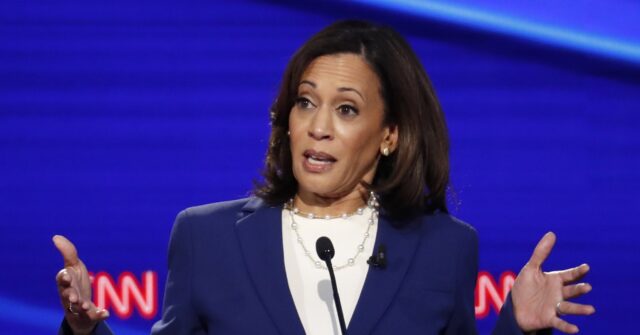The former vice president and avid abortion activist spoke of Generations Z’s supposed weather-trauma at the Fortune Most Powerful Women Gala at the Washington National Cathedral in D.C. on Oct. 14.
“They are experiencing what they’ve coined ‘climate anxiety,’ which is their fear that because of changing in extreme weather that the future of their lives is very much at stake,” Harris said. “My goddaughter, who’s a junior in college right now, was crying to me just two days ago, worried about ‘what is the world gonna be for me, auntie,’ she said, ‘when I want to have kids. Should I even be thinking about having children?’ That’s on top of unaffordable — not for her but for so many in that generation, they don’t aspire to own a home. They don’t believe it’s within their reach.”
Harris made similar remarks while speaking at Reading Area Community College in Reading, Pennsylvania in 2020 — remarks which resurfaced during the 2024 presidential election. She spoke at the time about how “young leaders” told her “about a term they’ve coined called ‘climate anxiety.’”
“Because young people said, ‘We’re not leaving it to other people to decide how we’re dealing with the climate crisis,’” Harris said. “You know, I’ve heard young leaders talk with me about a term they’ve coined called ‘climate anxiety.’”
Harris continued to explain that climate anxiety was the “fear of the future and the unknown of whether it makes sense for you to even think about having children, whether it makes sense for you to think about aspiring to buy a home because what will this climate be?”
Harris’s stepdaughter told her followers on TikTok in August that she feels “disgust” by what she is seeing in the world and said she is experiencing “a lot of climate anxiety” as well.
“I think everything with the environment is really f—king getting to me. … I experienced a lot of climate anxiety, like a lot of us do,” she said, making it clear that it is “not funny.”
Various surveys over the past few years have indicated a high percentage of young people are very concerned about the climate (see here, here, here, and here). A 2023 Pew Research survey interestingly found that 55 percent of Democrats believe the trend of having less children has a “positive impact” on the environment. This belief can likely be traced to 78 percent of Democrats believing that climate change is a “major threat to the country.”
Data from Pew Research in 2025 found people in their 20s and 30s plan on having fewer children than in the past, even as the U.S. birthrate lingers around its lowest level, below replacement rate.
But young people statistically putting off having children and having smaller families and the existence of “climate anxiety,” particularly among far-left youth, does not paint the full picture.
Gallup reported in September that even though the U.S. birthrate is at an all time low of 1.6 births per woman, Americans say the ideal family size is an average of 2.7 children. In 2023, Americans’ preference for larger families — having three or more children — reached its highest percentage since 1971 at 45 percent.
Gallup noted at the time that the increase in 2023 came decades after “concerns about a global population explosion, resulting from the 1968 eco-doom bestseller book entitled The Population Bomb,” written by Stanford University biologist Paul Ehrlich. The book notably generated mass hysteria over the future of the world and the earth’s ability to sustain human life yet was demonstrably proved wrong.
“Gallup has been measuring Americans’ opinions of the ideal family size periodically for almost 90 years. After falling steeply in the second half of the 20th century in parallel with the U.S. birth rate, Americans’ preferred family size has now stabilized at a level that well exceeds the actual rate,” the analytics firm reported in 2025. “The persistence of this gap suggests economic and cultural headwinds may be at work. High costs for housing, child care, healthcare and higher education, coupled with delayed marriage and parenthood, birth control and declining religiosity, are likely among the factors holding down birth rates despite a continued preference for more children.”
Gallup found differing attitudes about having children by subgroup. Specifically, men, U.S. adults who attend religious services weekly or monthly, Republicans, people of color, and men under the age of 50 are more likely than other groups to want three or more children.
“Meanwhile, adults who rarely or never attend religious services, Democrats, white people, adults under age 30, and women under age 50 are significantly more likely than their counterparts to say one or two children is ideal,” the report reads.
Katherine Hamilton is a political reporter for Breitbart News. You can follow her on X @thekat_hamilton.
Breitbart News
Read the full article .


